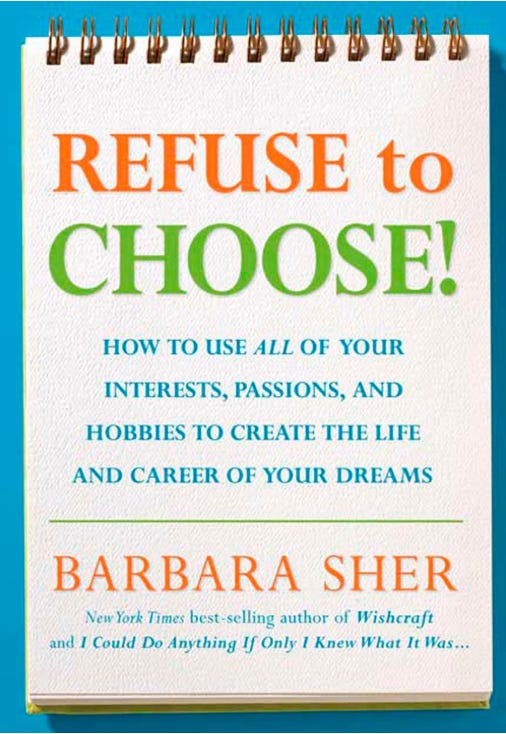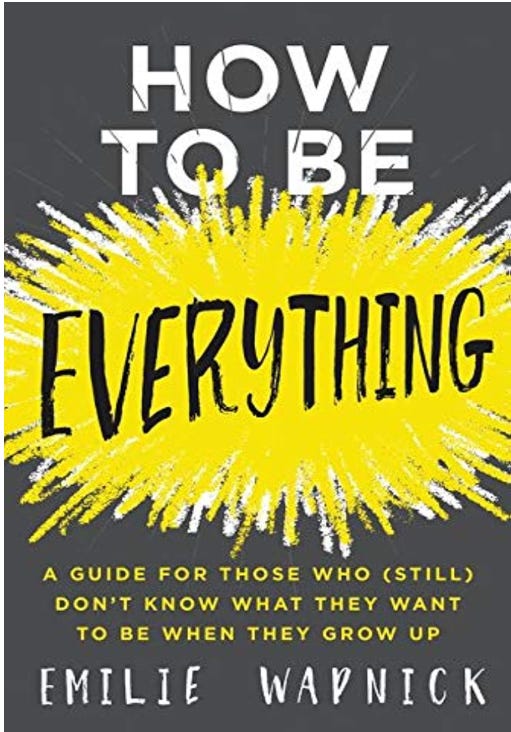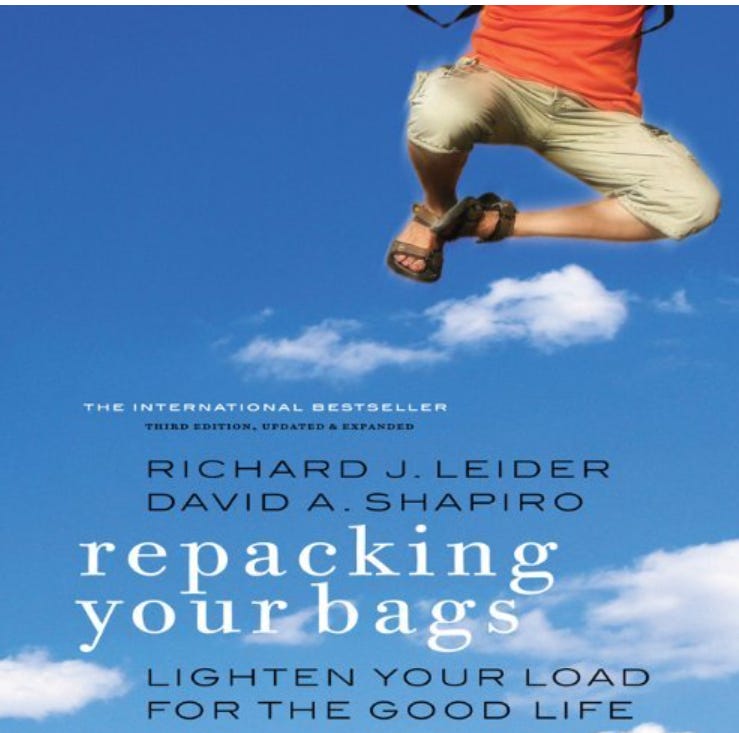Refuse to Choose: The Best Books for People Who Want to Do It All
Multipotentialite Survival Guide
Welcome to The Inclusion Room — a space where literature, science, and storytelling meet to unlock the power of diversity, inspiring both personal and professional growth.
Dear Readers,
I hope this letter finds you well!
One of Inclusion Room’s ambitions is to create a Virtual library of books and resources that will bring together knowledge and insights to:
Empower individuals to embrace their uniqueness and thrive outside the box.
Create a path towards building a more inclusive society for all.
I hope that these resources will offer you additional insights to deepen your reflections.
Some time ago, I wrote a post about being multipassionate — or having an ‘octopus mind’ — and how living abroad can become a catalyst for this way of living.
That post reached thousands of readers and sparked truly meaningful comments and conversations. So I know that among you, dear Inclusive Community, there are many multipassionate souls.
For years, I wandered from one interest to another, learning about topics that seemed totally unrelated. I often felt trapped in a single role, claustrophobic if I stayed too long in one city or country. I thought it was my problem — until I did my research and realized I wasn’t alone. There’s a word for people like me: I’m an explorer.
I told you my story in that post. Today, I want to share the resources that led me to my shift in awareness.
Here’s what I’ve put together for you:
📚 Three books helped me figure out how I’m wired and gave me tools to navigate life in my own unique way.
🙌 A community rich in first-hand experiences
💌 Two experiences shared by our Inclusion Room community
📚 Books
1. Refuse to Choose - Barbara Sher
The book that changed everything for me is Refuse to Choose by Barbara Sher .
This book helped me in two powerful ways:
1️⃣ It validated the way I am wired and gave me tools to make the most of it.
2️⃣ It gave me a community I could finally belong to.
3️⃣ It opened my eyes to new ways of combining creativity and work.
In its pages, I discovered so many ways of being multipassionate. I’m not usually a fan of labels — I dislike being boxed in — but in this case, giving a clear name to my wiring was liberating. I’m proud to call myself an explorer.
Who is an explorer?
Someone with an intense and endless curiosity for many subjects that seem unrelated.
An explorer is someone driven by curiosity and a deep fascination for novelty. They have an unshakable desire to venture into the unknown, an exceptional ability to grasp new concepts, and a boundless enthusiasm for experimentation. Above all, they are fueled by a passion for living life to the fullest.
I even learned there are different types of explorers. Most explorers share the same core feature: the urge to learn as much as possible. The difference lies in how they do it — the length of the learning cycle (weeks, months, years), whether they run projects in parallel or sequentially, whether they feel the need to finish things or happily move on without regrets.
Personally, I shift between different modes of exploration depending on the phase of my life.
My favorite tool? The Explorer Journal.
Being an explorer means that ideas or topics often pop up out of the blue while you’re working on something completely different. An explorer might feel guilty or wrong for abandoning a current project — or for adding yet another one to the table.
The idea behind the Explorer Journal is simple: you keep a notebook dedicated to all the activities and ideas you have, every day, week, or month (every explorer works with their own unique time frame!).
Just writing an idea or activity in your journal shifts your mindset: it reminds you that your thoughts deserve a place and that your unique wiring is worth respecting.
Another benefit is that your ideas will wait for you. When you come back, they’re there — ready to be explored again. I add a small update next to each idea or project whenever I return to my notebook to add something new.
In a world that celebrates single expertise and lifelong passion for one thing, I often felt alone with my cycles of intense interest — and the inevitable drop that followed. This book explained why that happens and how to turn my mindset into a source of fulfillment instead of self-doubt.
For months, I practiced the exercises Barbara Sher suggests, until they became second nature — a practical way to express and capitalize on my multipotentiality.
2. How To be Every thing - Emily Wapnick
Of course, being an explorer doesn’t pay the bills. Right?
When you jump from project to project — sometimes before even finishing — one day you’re deep into South American geopolitics and the next you’re obsessed with particle physics.
So how do you land a paid activity?
How do you build a life that lets you be everything?
How to Be Everything by Emilie Wapnick is one of the most practical books I’ve found for answering this question. She calls us multipotentialites — people with many passions, many interests, and the urge to explore them all.
How many of you were haunted by that classic question: What do you want to be when you grow up?
I can’t even remember my answer — mostly because it changed every year! My mother remembers I said “psychologist”, my father says “interpreter”. I still recall an exercise in high school where we had to imagine ourselves in twenty years. Panic mode! I wrote “archaeologist” — but I’m sure I had three other versions ready, just in case.
Emily Wapnick’s book is liberating. She explains:
✅ The superpowers of multipotentialites — my favorite are adaptability, fast learning, and the ability to make unexpected connections.
✅ The three key ingredients of a multipotentialite’s life: money, meaning, and variety.
✅ Practical ways to combine your passions into work that actually pays
✅ Clear structures for living off your passions while building a sustainable career.
Ever heard of the “Einstein Approach”? While working as a patent examiner (a “good enough job”, as Barbara Sher would say — yes, Emilie Wapnick is a big fan of Barbara too!) Einstein kept researching and published his groundbreaking papers on the side. Funny enough, I was also a patent examiner for a while — so I love this example!
Maybe you’ve heard the modern word Slashing: it means combining different jobs or roles that tap into different interests.
Emily Wapnick shows many models, so you can find the mix that fits you best.
3. Repacking you bags - Richard J. Leider, David A. Shapiro
What happens when you combine being an explorer with traveling and living abroad?
As I explained in my previous post,living abroad often amplifies your multipotentiality.
You switch languages, roles, and routines.
You adapt, reinvent yourself, and connect cultures.
What often sets an explorer in motion is boredom — or a craving for novelty.
Sometimes, the place you live in, for various reasons, can trigger both feelings — even if you’re not a pure explorer at heart. But when you are an explorer, this thirst for newness becomes a powerful engine.
The challenge is to channel that energy wisely, making the right choices when you decide to move on.
I’m fascinated by people who turn their work into a way to live different experiences — giving themselves the chance to reinvent who they are each time. It has become my life model.
I was on my third expatriation when I discovered this book. I was living a good life: surrounded by international friends, a good job, in a country with a great quality of life. But something still felt off.
Around me, I saw others like me — restless for the same reasons. One day, they would make a big move, only to regret it later because “they hadn’t asked themselves the right questions.” I’ve heard that line so many times after the fact.
This book became an essential tool when I chose to move back to France — my first expat country. The game changer was the idea of the Vision of the Good Life.
The authors offer a framework of Good Life characteristics — helping you measure how close (or far) you are from the life you truly want at that particular moment. If you’re too far away, then the message is clear: pack your bags and get closer to the experience that brings you back to it!
The framework’s dimensions are diverse and flexible: your sense of belonging, work, spirituality, relationships, and more.
I used this framework when I decided to leave the Netherlands and return to France — and I still use it regularly to ask myself: Should I stay or should I go?
🙌 A community
When you’re a multipotentialite, you crave meeting others like you and sharing all the projects you have on the table, right?
Emilie Wapnick gave an inspiring TEDx Talk where she introduces her community of Multipotentialites.
Check out the talk here: TEDx
And the Community here: Puttylike - a Home for Multipotentialite
💌 From our community
A real-world translation of multipotentiality in the job market is simple: being a generalist in a world that favors specialists.
Who are generalists?
To borrow the words of an unapologetic generalist,
:The thing is, generalists don’t just fit into one role—they aren’t wired for it. Instead, they work across multiple functions, often filling the gaps in between.
And the “for whom”? Well, that depends. Most generalists are highly adaptable across industries, target audiences, and business models.
But here’s the reality: finding your place — and landing fulfilling work — as a generalist today isn’t always easy.
Are you one of us? I recommend reading Caterina’s post:
She breaks down the biggest challenges generalists face today and shares practical strategies to help you secure your next opportunity in a world still dominated (for now) by specialists.
And if you’re a writer, you’re probably an explorer too. The perfect combo? A writer and a traveler.
is a great example of an explorer who’s carved out multiple paths — and proves you don’t have to choose just one.Enjoyed the recommendations?
New titles join our Virtual Library every month — don’t miss out! I host a community chat each month to collect your ideas and contributions, so stay tuned and bring your own posts to the table!
Join the Conversation
What books or resources have helped your understanding of how you are wired?
Have you written a post about it?
Feel free to share your favorite reads or drop the link to your post — I’d love to explore your perspective.









I recall seeking out Emily Wapnick too! Interesting take on the match between multipotentialites and world travel.
I might be up for a book club, but I never have the patience to read all the way to the end! I come for the conversation.
Ohh, what an interesting article! Thank you so much for the mention too!! I read "How to be everything before" and I find myself going back to it over and over. Such an important book for all the generalists out there! 🥹